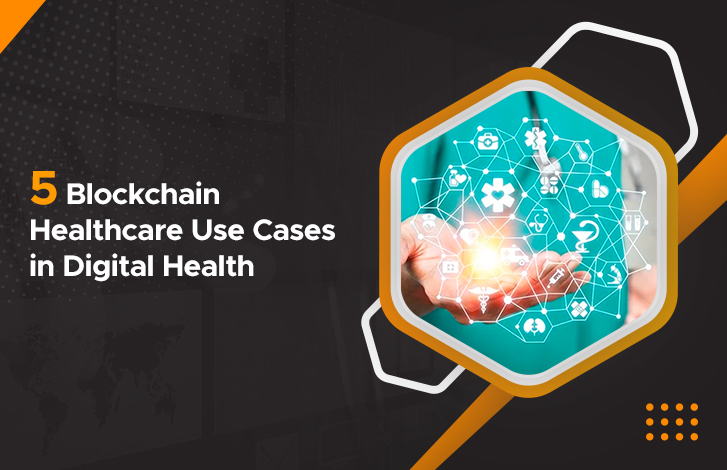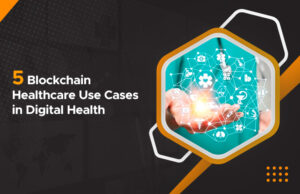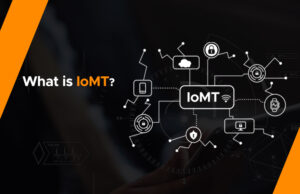Blockchain is a distributed ledger technology that enables secure and transparent transactions among multiple parties without intermediaries. Blockchain has been widely adopted in various industries, such as finance, supply chain, and education.
However, blockchain has great potential to transform the healthcare industry, especially digital health. Digital health refers to using information and communication technologies to deliver health services and improve health outcomes. Digital health encompasses various domains, such as telemedicine, mobile health, Electronic Health Records (EHR), wearable devices, and artificial intelligence.
This article will explore five blockchain healthcare use cases in digital health that could improve healthcare services and data access, quality, efficiency, and security.
1. Patient Data Management
One of the most common blockchain healthcare use cases is patient data management. Patient data is often fragmented and siloed across different healthcare providers, systems, and platforms, making it difficult to access, share, and update. This can result in errors, delays, duplication, and inefficiency in healthcare delivery and coordination.
Blockchain enables a patient-centric approach to data management where patients have full control and ownership of their data. Patients can store their data on a blockchain-based platform that ensures its security, integrity, and privacy. Patients can also grant or revoke access rights to their data to different healthcare providers or entities according to their preferences and needs. Moreover, blockchain can facilitate data interoperability and exchange among different systems and platforms, enabling seamless data sharing and collaboration among healthcare stakeholders.
For example, MedRec is a blockchain-based platform that aims to provide a transparent and accessible view of medical history for patients and providers. MedRec uses smart contracts to manage authentication, confidentiality, accountability, and data sharing among authorized users. It also incentivizes providers to maintain the blockchain through a reward system that grants them access to aggregated and anonymized data for research purposes.
2. Supply Chain Management
Another blockchain healthcare use case is supply chain management. Supply chain management involves planning, sourcing, manufacturing, distributing, and delivering products or services. In healthcare, supply chain management is crucial for ensuring the quality, safety, and availability of drugs and medical devices.
However, healthcare supply chains are often complex, opaque, and inefficient, involving multiple intermediaries and stakeholders. This can result in counterfeit products, fraud, theft, losses, recalls, and waste.
Blockchain can enhance transparency and traceability in healthcare supply chains by creating a shared ledger that records every transaction and movement of products or services along the supply chain. Blockchain can also enable smart contracts that automate transactions and enforce rules among supply chain participants. Furthermore, blockchain can integrate with IoT devices that monitor the condition and location of products or services in real-time.
For example, MediLedger is a blockchain-based platform that aims to improve the efficiency and security of pharmaceutical supply chains. MediLedger uses blockchain to verify the identities of supply chain participants and track the provenance and status of pharmaceutical products. MediLedger also uses smart contracts to facilitate contract management and chargeback reconciliation among supply chain partners.
3. Identity Management
A third blockchain healthcare use case is identity management. Identity management involves verifying, authenticating, authorizing, and managing the identities of individuals or entities. In healthcare, identity management is essential for ensuring the privacy and security of patients’ personal information and medical records.
However, identity management in healthcare is often challenging due to the need for more standardization, interoperability, and trust among different systems and platforms. Patients may have multiple identities across providers or entities, creating confusion and inconsistency. Providers may also face difficulties in verifying the identities of patients or other providers, which can increase the risk of identity theft or fraud.
Blockchain enables a decentralized and self-sovereign approach to identity management, where individuals or entities can create and manage their digital identities on a blockchain-based platform. Trusted third parties or peers on the network can verify these digital identities. They can access or provide various services or resources across different systems or platforms. Blockchain can also enable verifiable credentials that prove certain attributes or qualifications of individuals or entities, such as vaccination status or professional licenses.
For example, Civic is a blockchain-based platform that aims to provide secure and low-cost identity verification services for individuals and businesses. Civic uses blockchain to store and protect users’ identity data. It allows users to share their data with verified service providers or entities through a QR code or a mobile app. Civic also uses smart contracts to facilitate identity verification transactions and reward users and service providers with Civic tokens.
4. Data Analytics and Research
A fourth blockchain healthcare use case is data analytics and research. Data analytics and research involve collecting, analyzing, and interpreting data to generate insights, knowledge, and solutions. In healthcare, data analytics and research are vital for improving clinical decision-making, diagnosis, treatment, prevention, and innovation.
However, the need for more data availability, quality, and interoperability frequently hinders data analytics and research in healthcare. Healthcare data is often scattered across different sources, systems, and platforms, making it hard to access, aggregate, and integrate. Healthcare data is also often sensitive, confidential, and regulated, making it difficult to share, exchange, and use.
Blockchain can enable a collaborative and secure approach to data analytics and research, where healthcare stakeholders can share and access data on a blockchain-based platform that ensures its security, integrity, and privacy. Blockchain can also enable data monetization and incentivization, where data owners can sell or donate their data to data buyers or researchers and receive rewards or compensation in return. Moreover, blockchain can enable data provenance and verification, where data sources and processes can be traced and validated.
For example, Nebula Genomics is a blockchain-based platform that empowers individuals to own and control their genomic data. Nebula Genomics uses blockchain to store and protect users’ genomic data and allows users to sell or share their data with researchers or companies through a marketplace. Nebula Genomics also uses blockchain to verify genomic data’s quality and origin and reward users and buyers with Nebula tokens.
5. Digital Health Passports
A fifth blockchain healthcare use case is digital health passports. Digital health passports are digital certificates that prove individuals’ health-related information or status, such as vaccination records, test results, or immunity status. Digital health passports facilitate travel, work, education, and social activities amid the COVID-19 pandemic or other health emergencies.
However, digital health passports pose several challenges regarding standardization, interoperability, and trust among countries, regions, or organizations. Digital health passports also raise concerns about individuals’ health information privacy, security, and ethics.
Blockchain can enable a universal and verifiable approach to digital health passports, where individuals can store and manage their health information on a blockchain-based platform that ensures its security, integrity, and privacy. Blockchain can also enable verifiable credentials that prove certain health information or status of individuals, such as vaccination records, test results, or immunity status. Trusted third parties, or peers on the network, can verify these verifiable credentials. They can be used to access or provide various services or resources across different countries, regions, or organizations.
For example, IBM Digital Health Pass is a blockchain-based platform that aims to provide individuals with a secure and verifiable way to manage their health information. IBM Digital Health Pass uses blockchain to store and protect users’ health information. Users can share their information with verified entities through a QR code or a mobile app. IBM Digital Health Pass also uses blockchain to verify users’ health information’s authenticity and validity and ensure compliance with relevant laws and regulations.
Conclusion
Blockchain is a distributed ledger technology that enables secure and transparent transactions among multiple parties without intermediaries. Blockchain has great potential to transform the healthcare industry, especially in digital health. Digital health refers to using information and communication technologies to deliver health services and improve health outcomes. This article explored five blockchain healthcare use cases in digital health that could improve healthcare services and data access, quality, efficiency, and security. These use cases are:
- Patient data management
- Supply chain management
- Identity management
- Data analytics and research
- Digital health passports
The potential for blockchain technology in healthcare is being realized increasingly, with the possibility of revolutionizing the entire industry. Many healthcare and blockchain companies are working on or have already released blockchain-based systems to improve healthcare for professionals and patients. By decentralizing patient health information, tracking pharmaceuticals, verifying identities, sharing data, and proving health status, blockchain is becoming a valuable tool for healthcare, revolutionizing the industry worldwide.







